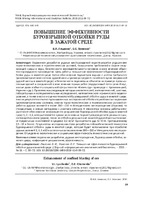Enhancement of confined blasting of ore
Zusammenfassung
Underground mining of ore deposits features worsening of geological and geotechnical conditions, exclusive standards of environmental protection and subsoil conservation as well as more stringent requirements of life safety in the influence zones of mining. This study focuses on higher efficiency of confined blasting through justification of blast design with regard to a required grain-size composition of broken ore (average linear size of ore particle after confined blasting) and safety of guarded objects in terms of industrial and residential infrastructure in the influence zone of mining (the Ingul River underflow, domestic buildings and social framework objects in the settlement of Kizelgur in the suburb of the Kropyvnytskyi city, Ukraine, etc.). The study used analytical, mathematical, in-mine, laboratory and experimental research methods, mathematical and physical modeling, as well as the analysis and assessment of the confined blasting technologies, implementation analysis of pilot confined blasting at the preset grain-size composition, and the analysis of geological and geomechanical conditions on Level 280–210 m in the Michurin deposit (Ukraine) by standard and new procedures (developed with participation of the present article authors). The novelty of this study is justification of the ratio of fragmentation by confined blasting as 1.2–1.3. The fragmentation ratio is one of the main parameters in calculation of length of a section composed of layers (rows). After confined blasting in such section, fragmentation is limiting and equals on average 3.0 kg/m3 at rock hardness of 12–18 and more on Protodyakonov’s scale. As a result of the implemented research, a seismically safe confined blasting technology was developed to be applied in extraction of ore bodies 1, 4, 5 and 10, as well as residual reserves on level 280–210 m of the Michurin deposit. The ecological and social efficiency of the engineering solutions is evaluated.

